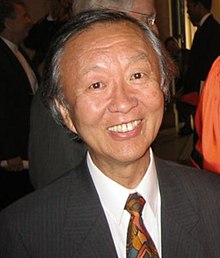| Charles K. Kao | |||||||||||||||||||
|---|---|---|---|---|---|---|---|---|---|---|---|---|---|---|---|---|---|---|---|
| Traditional Chinese | 高錕 | ||||||||||||||||||
| Simplified Chinese | 高锟 | ||||||||||||||||||
| |||||||||||||||||||
Sir Charles Kao Kuen (simplified Chinese: 高锟; traditional Chinese: 高錕; pinyin: Gāo Kūn) GBM KBE FRS FREng[5][6][7][8][9] (November 4, 1933 – September 23, 2018) was a Chinese physicist and Nobel laureate who contributed to the development and use of fibre optics in telecommunications. In the 1960s, Kao created various methods to combine glass fibres with lasers in order to transmit digital data, which laid the groundwork for the evolution of the Internet and the eventual creation of the World Wide Web.
Kao was born in Shanghai. His family settled in Hong Kong in 1949. He graduated from St. Joseph's College in Hong Kong in 1952 and went to London to study electrical engineering. In the 1960s, Kao worked at Standard Telecommunication Laboratories, the research center of Standard Telephones and Cables (STC) in Harlow, and it was here in 1966 that he laid the groundwork for fibre optics in communication.[10] Known as the "godfather of broadband",[11] the "father of fibre optics",[12][13][14][15][16] and the "father of fibre optic communications",[17] he continued his work in Hong Kong at the Chinese University of Hong Kong, and in the United States at ITT (the parent corporation for STC) and Yale University. Kao was awarded the Nobel Prize in Physics for "groundbreaking achievements concerning the transmission of light in fibres for optical communication".[18] In 2010, he was knighted by Queen Elizabeth II for "services to fibre optic communications".[7]
Kao was a permanent resident of Hong Kong,[19] and a citizen of the United Kingdom and the United States.[3]
- ^ "List of Fellows". Archived from the original on June 8, 2016. Retrieved October 20, 2014.
- ^ Cite error: The named reference
frswas invoked but never defined (see the help page). - ^ a b c d The Nobel Prize in Physics 2009 – Press Release. Nobel Foundation. October 6, 2009. Archived from the original on May 30, 2013. Retrieved October 8, 2009.
- ^ Cite error: The named reference
UCLwas invoked but never defined (see the help page). - ^ Charles K. Kao was elected in 1990 Archived February 15, 2021, at the Wayback Machine as a member of National Academy of Engineering in Electronics, Communication & Information Systems Engineering for pioneering and sustained accomplishments towards the theoretical and practical realization of fiber-optic communication systems.
- ^ "306 people to receive honours". The Government of Hong Kong SAR. July 1, 2010. Retrieved July 1, 2010. [dead link]
- ^ a b "No. 59446". The London Gazette (1st supplement). June 12, 2010. p. 23.
- ^ "- Royal Society".
- ^ "The Fellowship – List of Fellows". Raeng.org.uk. Archived from the original on June 12, 2011. Retrieved October 26, 2009.
- ^ Hecht, Jeff (1999). City of Light, The Story of Fiber Optics. New York: Oxford University Press. p. 114. ISBN 0-19-510818-3.
- ^ Mesher, Kelsey (October 15, 2009). "The legacy of Charles Kao". Moun. Archived from the original on February 15, 2021. Retrieved November 30, 2009.
- ^ dpa (October 6, 2009). "PROFILE: Charles Kao: 'father of fiber optics,' Nobel winner". Earthtimes. Archived from the original on February 15, 2021. Retrieved November 30, 2009.
- ^ Record control number (RCN):31331 (October 7, 2009). "'Father of Fibre Optics' and digital photography pioneers share Nobel Prize in Physics". Europa (web portal). Archived from the original (cfm) on January 25, 2008. Retrieved November 30, 2009.
{{cite web}}: CS1 maint: numeric names: authors list (link) - ^ Bob Brown (Network World) (October 7, 2009). "Father of fiber-optics snags share of Nobel Physics Prize". cio.com.au. Archived from the original on February 15, 2021. Retrieved November 30, 2009.
- ^ "The father of optical fiber – Narinder Singh Kapany/Prof. C. K. Kao" (in Chinese and English). networkchinese.com. Archived from the original on September 23, 2009. Retrieved October 8, 2009.
- ^ Erickson, Jim; Chung, Yulanda (December 10, 1999). "Asian of the Century, Charles K. Kao". Asiaweek. Archived from the original on July 21, 2002. Retrieved December 24, 2009.
- ^ "Prof. Charles K Kao speaks on the impact of IT in Hong Kong". The Open University of Hong Kong. January 2000. Archived from the original on February 15, 2021. Retrieved December 24, 2009.
- ^ The Nobel Prize in Physics 2009. Nobel Foundation. October 6, 2009. Archived from the original on October 8, 2009. Retrieved October 6, 2009.
- ^ 高錕. 香港百人 (in Cantonese, Chinese, and English). Asia Television. 2011.
